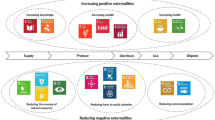Abstract
Trade regimes at all levels have confronted the dual challenge of rapidly expanding foreign direct investment, and the vigorous growth of international environmental regimes. Attempts to develop a global investment regime have encountered resistance, not least from environmental interests. At the same time, regional trade regimes have sought to address both the environmental and the investment agenda but in a very different manner. This article looks at problems encountered with the investor-state dispute settlement process established by the North American Free Trade Agreement (NAFTA). The institutional dimension of this process is largely drawn from the General Agreement on Tariffs and Trade (GATT), and existing international institutions for commercial arbitration. The article traces some of the difficulties encountered in attempting to use institutions designed for a specific purpose and implemented in one organizational context, to achieve a different purpose in another organizational context. It discusses the problems that arise when institutions appropriate for settling commercial disputes between private actors are used as the basis for balancing private interests and public goods, the environment in particular. It highlights the importance of a more developed understanding of the interplay between institutions and organizations at the international level so as to avoid undesired outcomes.
Similar content being viewed by others
References
Birchall, C. J. (1998), ‘NAFTA and the Environment: Canada Settles Ethyl Suit’, Environmental Law 3, 158–160.
De la Calle, L. (1999), ‘Linkages Between Trade and Environmental Policies’, Speech delivered to the WTO High Level Symposium on Trade and Environment, available at <http://www.wto.org>
Camp, H. and A. Kontrimas (1996), ‘Direct Investment Issues (Including Competition and US/Mexico Taxation Treaty’, in J. J. Norton et al., eds., NAFTA and Beyond: A New Framework for Doing Business in the Americas (pp. 87–102).
Department of Foreign Affairs and International Trade, Canada (DFAIT 1999), The NAFTA at Five Years: A Partnership at Work, available at <http://www.dfait-maeci.gc.ca/nafta-alena>
Douglas, P. B. and T. Ueno (1998), ‘A Practitioner's Guide to Chapter 11 of NAFTA’, in L'ALÉNA et l'avocat d'affaires, pp. 143–168.
Fried, J. (1997), ‘Globalization and International Law-Some Thoughts for Citizens and States’, Queens Law Journal 23, 251–274.
Government of Canada (1994), Statement on Implementation of the North American Free Trade Agreement, Canada Gazette Part 1C(1), January 1999.
Government of the United States (1994), Statement as to How the NAFTA Serves the Interest of United States Commerce.
Haigh, N (looseleaf), European Environmental Policy. Britain and the European Community. London: Elsevier.
Herman, L. (1998), ‘Settlement of International Trade Disputes-Challenges to National Sovereignty-A Canadian Perspective’, Canada-United States Law Journal 24, 121–137.
Horlick, G. and F. A. DeBusk (1993), ‘Dispute Resolution Under NAFTA: Building on the US-Canada FTA, GATT and ICSID’, Journal of World Trade 27, 21–41.
Horlick, G. and A. Marti (1997), ‘NAFTA Chapter 11B: A Private Right of Action to Enforce Market Access through Investments’, Journal of International Arbitration 14, 43–54.
Johnson, P. M. and A. Beaulieu (1994), The Environment and NAFTA. Washington, DC: Island Press.
Mann, H. and K. von Moltke (1999), NAFTA's Chapter 11 and the Environment. Addressing the Impacts of the Investor-State Process. Winnipeg: International Institute for Sustainable Development, available at <http://www.iisd1.ca/trade>
von Moltke, K. (1996), International Environmental Management, Trade Regimes, and Sustainability. Winnipeg: International Instiute for Sustainable Development, available at <http://www.iisd1.ca/trade>
von Moltke, K (2000a), ‘El medio ambiente en la Unión Europea: ¿Lecciones para el Mercosur?’, in K. von Moltke et al., El medio ambiente en el Mercosur. Washington: Interamerican Development Bank (forthcoming).
von Moltke, K (2000b), ‘El medio ambiente en el TLCAN (NAFTA): ¿Lecciones para el Mercosur?’, in K. von Moltke et al., El medio ambiente en el Mercosur. Washington: Interamerican Development Bank (forthcoming).
von Moltke, K. (2000c), ‘Investment, Non-discrimination, and the Environment’ (manuscript available from the author).
N.N. (1999), ‘Mexico: Private Sector Shows Confidence in Mexico's Economy’, NAFTA Works 4(3).
Organisation for Economic Cooperation and Development (OECD 1992), The Polluter Pays Principle: OECD Analyses and Recommendations. Paris: OECD.
Ostry, S. (1999), ‘Future of the WTO’, Brookings Institute Trade Policy Forum, 15 April 1999, 4.
de Pencier, J. (1998), ‘Lost Opportunity-The Multilateral Agreement on Investment and the Environment’, Environmental Law 3(2), 138–157.
Price, D. M. (1993), ‘An Overview of the NAFTA Investment Chapter: Substantive Rules and Investor State Dispute Settlement’, International Lawyer 27, 727–736.
Rugman, A., J. Kirton and J. Soloway (1999), Environmental Regulation and Corporate Strategy: A NAFTA Perspective. New York: Oxford University Press.
Sacerdoti, G. (1997), ‘Bilateral Treaties and Multilateral Instruments on Investment Protection’, in Academy of International Law, Hague Recueil des Cours.
Sandrino, G. L. (1994), ‘The NAFTA Investment Chapter and Foreign Direct Investment in Mexico: A Third World Perspective’, Vanderbilt Journal of Transnational Law 24, 259–327.
Schneiderman, D. (1996), ‘NAFTA's Takings Rule: American Constitutionalism Comes to Canada’, University of Toronto Law Journal 46, 499–537.
Soloway, J. (1999), ‘NAFTA's Chapter 11: The Challenge of Private Party Participation’, Journal of International Arbitration 16.
Soloway, J. (1999a), ‘Environmental Trade Barriers Under NAFTA: The MMT Controversy’, Minnesota Journal of Global Trade 8, 55–95.
Thomsen, S. (1999), ‘Recent Trends in Foreign Direct Investment’, OECD Report, 27 May 1999, available at <http://www.oecd.org/daf/cmis/fdi/fdibis.pdf>
World Trade Organisation (1998), ‘United States-Import Prohibition of Certain Shrimp and Shrimp Products’, Appellate Body Report AB-1998–4, available at <http://www.wto.org>
Author information
Authors and Affiliations
Rights and permissions
About this article
Cite this article
von Moltke, K., Mann, H. Misappropriation of Institutions: Some Lessons from the Environmental Dimension of the NAFTA Investor-State Dispute Settlement Process. International Environmental Agreements: Politics, Law and Economics 1, 103–119 (2001). https://doi.org/10.1023/A:1010122011573
Issue Date:
DOI: https://doi.org/10.1023/A:1010122011573




